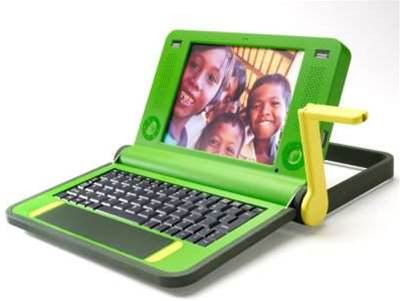
The One Laptop per Child (OLPC) project is planning to launch its notebook computers as "2B1".
"While we haven't settled on a final launch name, it is likely to be the 2B1, " Walter Bender, who heads up the One Laptop per Child's software and content program, told vnunet.com.
The name should be pronounced as "to be one" and refers to the OLPC's goal of uniting the world's children through the use of technology, Bender explained.
Bender published the 2B1 name on the project's Wiki last Sunday, but the site doesn't mention that it is the proposed launch name.
The unveiling was intended to keep the public informed of the project's current thinking, as well as prevent confusion over the naming, he said.
The project internally has been using the Children's Machine 1 (CM1) codename. The name last week started appearing in media reports, on the project's wiki as well as on a Wikipedia entry on the project.
"The Children's Machine (CM1) is our internal working name for the laptop and one that will likely be used throughout the B-Test period," said Bender.
"It is unlikely to be the name of the final product."
The project uses the term B-Test for units that are tested automatically, marking the last step before mass manufacturing. Prototypes with so-called A-Test logic boards were tested manually.
The B-Test units will be shipped to nations that are considering to purchase the laptops this fall, including Thailand and Nigeria.
The OLPC computers offer an AMD powered, Linux-based laptop with wireless connectivity. The battery can be manually recharged, possibly by some kind of foot pedal.
The laptops are commonly referred to as the US$100 Laptop, in a reference to a US$100 price tag that the project targeted when it first started working on the design.
The initial units however are expected to cost about US$135 each and will be available early next year, the project's chairman Nicholas Negroponte said in April. He expected at the time that prices by 2010 will have dropped to US$50 per unit.
The OLPC programme refers to the Children's Machine as an education project that provides children in developing nations with access to information and allows them to develop programming skills.
Several nations have expressed interest in the laptops, that will be sold directly to governments in one million increments. Contrary to earlier reports, the project doesn't yet accept orders.
Intel launched a competing US$400 Eduwise laptop earlier this year. Both Intel and Microsoft have criticised the OLPC project.
Intel chairman Craig Barrett dismissed the project as a "US$100 gadget", and Microsoft chairman Bill Gates criticised the small screen.
• A video demonstration of the first working OLPC prototype is available on the Silicon Valley Sleuth blog.

_(23).jpg&h=140&w=231&c=1&s=0)

.png&h=140&w=231&c=1&s=0)
_(20).jpg&h=140&w=231&c=1&s=0)





 iTnews Benchmark Awards 2026
iTnews Benchmark Awards 2026
 iTnews Executive Retreat - Security Leaders Edition
iTnews Executive Retreat - Security Leaders Edition
 iTnews Cloud Covered Breakfast Summit
iTnews Cloud Covered Breakfast Summit
 The 2026 iAwards
The 2026 iAwards












_(1).jpg&h=140&w=231&c=1&s=0)



